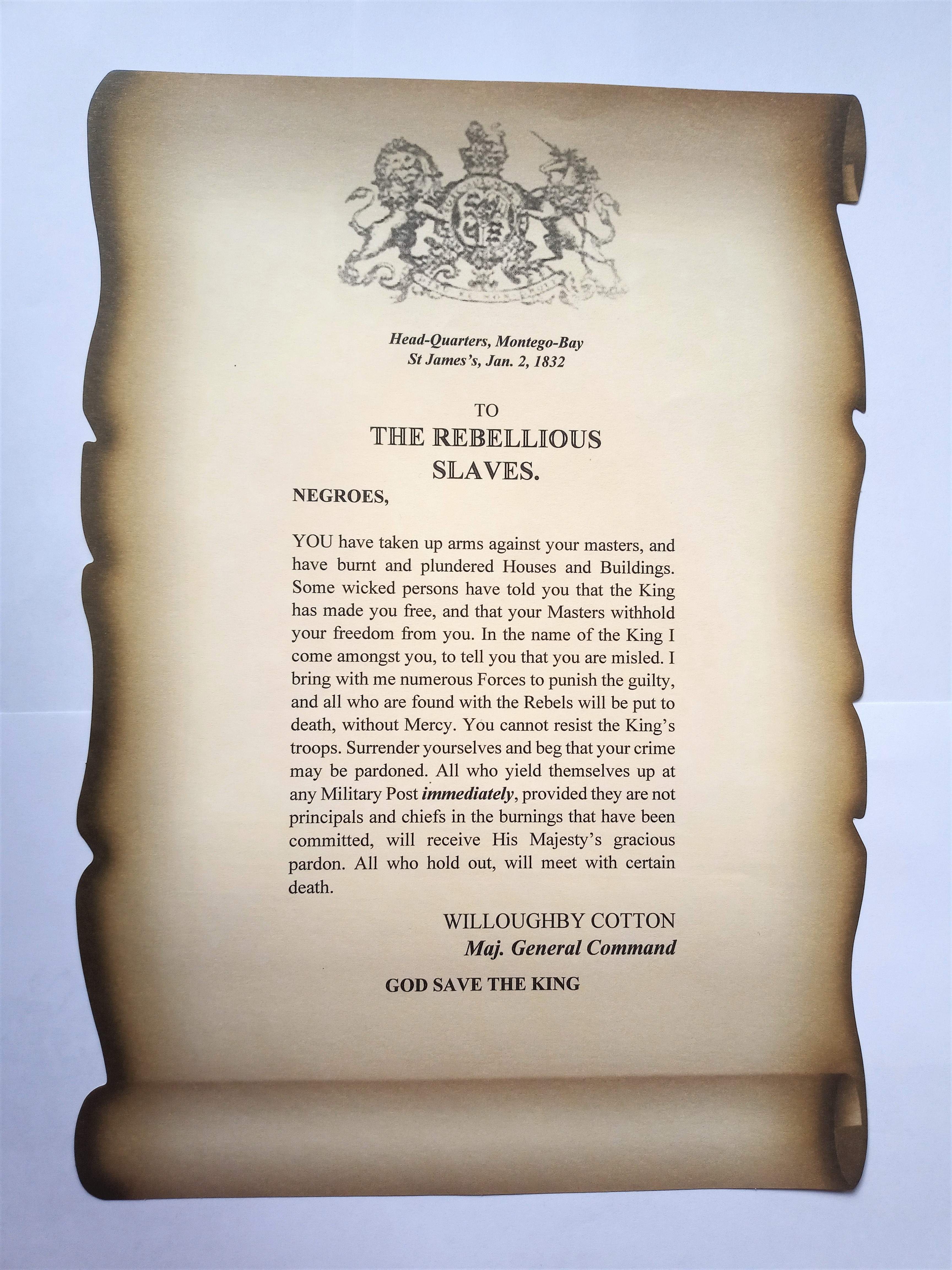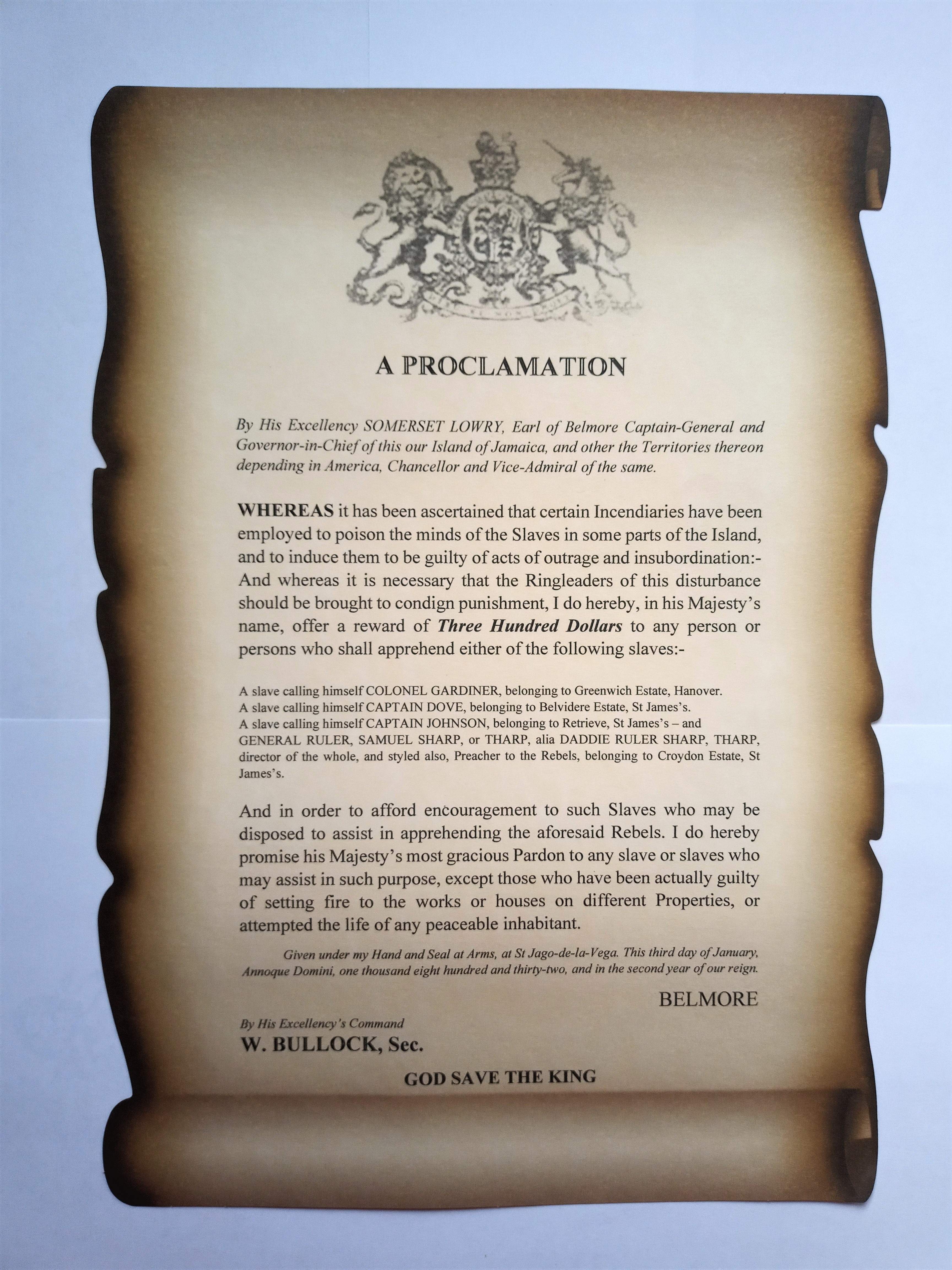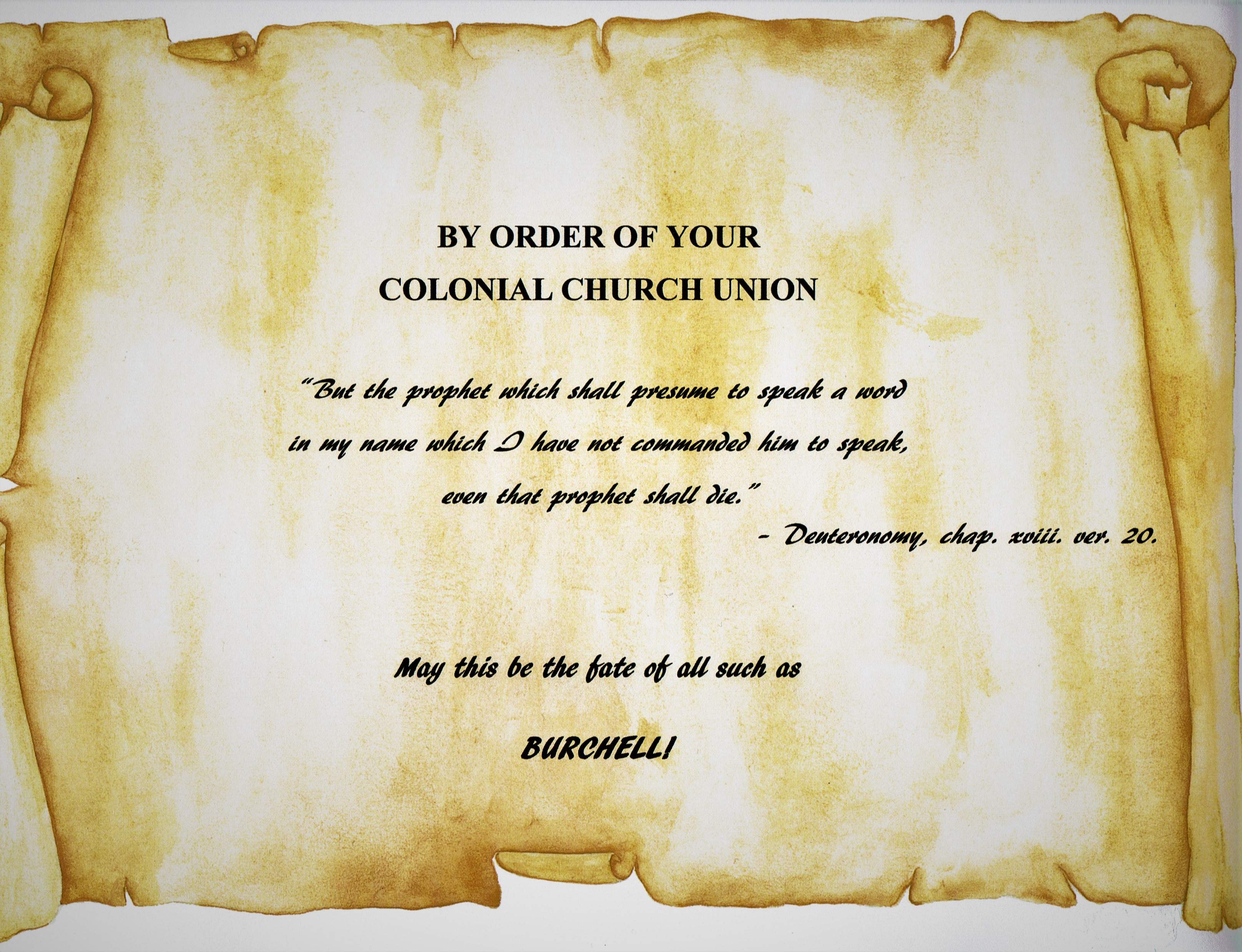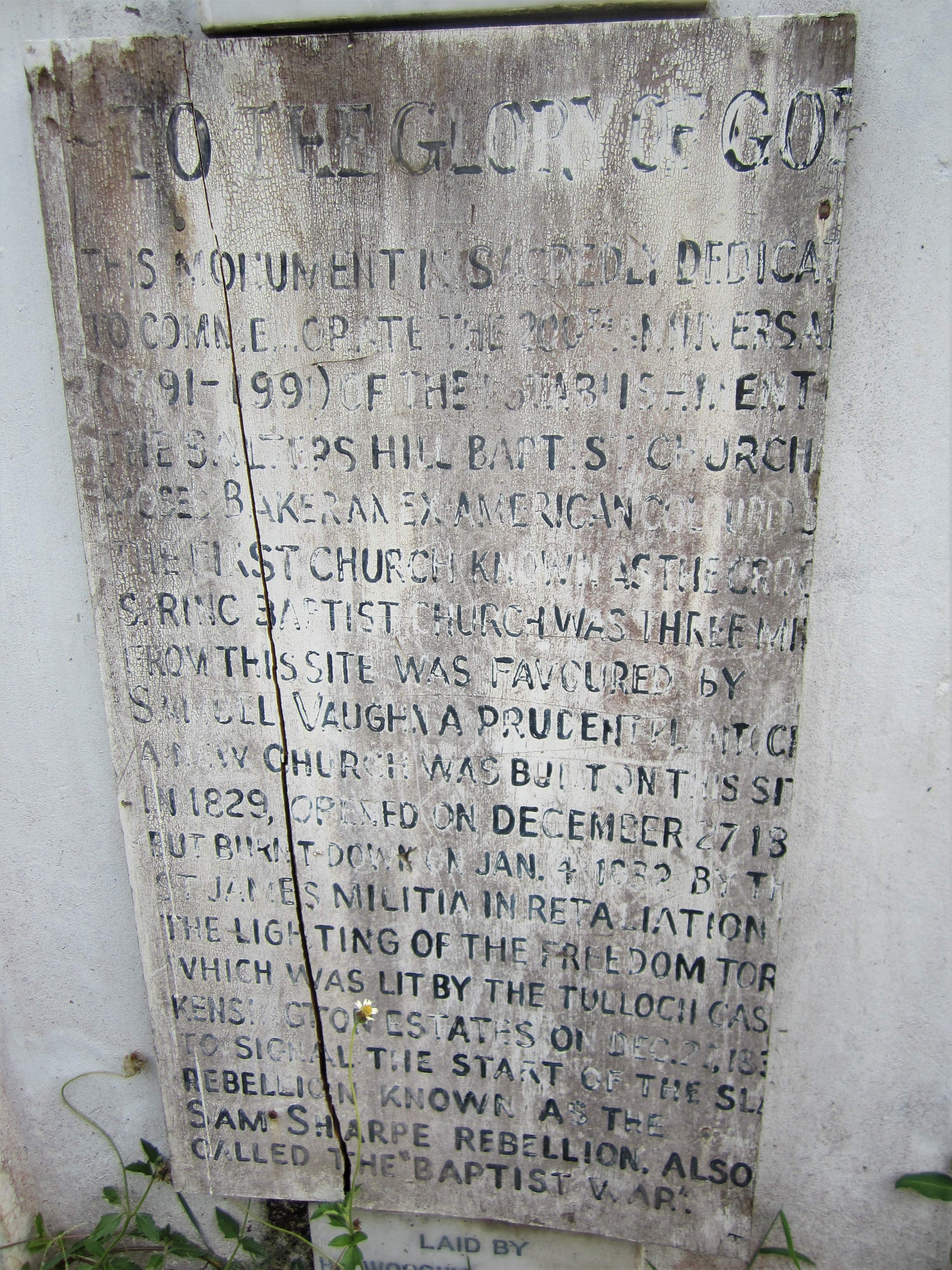JANUARY
1. January 1783. The Jamaica to which George Lisle and his colleagues arrived considered itself to be under “siege.” Having been defeated in America, Britain continued to be under threat from the French, who saw this as an opportunity to not only take significant territory from them, but the most significant of all their islands in the British Caribbean, Jamaica, the “jewel in the crown.” The governor of Jamaica therefore had no hesitation in extending a warm welcome to not just the 3,000 loyalists, and the 8,000 slaves who came with them, but also to Lisle and his family, their experiences of battle being seen as a very valuable asset.
2. January 19, 1788. Referring to Andrew Bryan, a “disciple” of Lisle, his regional Baptist association wrote in affirmation: “This is to certify, that the Ethiopian church of Jesus Christ at Savannah, have called their beloved Andrew to the work of the ministry. We have examined into his qualifications, and believing it to be the will of the great Head of the church, we have appointed him to preach the Gospel, and to administer the ordinances, as God in his providence may call.
3. January 4, 1803. Mr Williams and two others had applied to the magistrates in quarter sessions, to take the required oaths, but were ordered off by the chief magistrate, who said, “They ought to be committed for daring to address the Court.” On the following day Mr Williams and about twenty serious persons met for prayer and praise. Information was speedily given and he was brought before five magistrates, and as it was proved, sentenced to one month’s hard labour in the workhouse. He was not however, chained to convict slaves, but confined in a small close room with a damp brick flooring. When his month was up, he was required to find bail to appear for trial, at the quarter sessions for having allowed his house to be used for prayer and preaching. He refused to enter into bail, and after being confined one day beyond his sentence, he was let go.
4. 18th January, 1808. Mr Wiggins applied for a licence to preach, but was refused. Mr Bradnock also presented his licence, with the seal of the Lord Mayor of London; but a decided opposition was now determined upon by the city authorities. The chapel was assaulted with stones in open day; and it was threatened by some that the premises would be set on fire.
5. January 19, 1815. Lee Compere was the second missionary to arrive in Jamaica, but his tenure lasted barely a year. Little is said of his time on the island, due to what seems to have been something of a falling out between him and the Committee over his lived experiences while there. Compere was born in Essex, and like Rowe attended Bristol College, after which time he was set apart for ministry in Jamaica. Compere, his wife, together with two members of Ryland’s Church left England on November 21, 1815, sailing into Kingston.
6. January 19, 1823. Thomas Knibb was the first school teacher to be commissioned, arriving in Kingston. He began work at East Queen Street, however, after contracting yellow fever, he died just over a year later on April 22, 1824.
7. January 15, 1824. Having received his commission on the October 14, 1823, Thomas Burchell set sail for Jamaica some five days later. He began his ministry in Montego Bay.
8. January 25, 1824. While Thomas Burchell may have believed himself to be rather “shy and retiring” in certain circumstances, it soon became clear that he was actually “cut from the same cloth” as Moses Baker. How the hearts of the people must have swelled with both happiness and relief, when at his very first meeting at the church at Crooked Spring, when he announced to them the good news of the coming Christ, taken from Luke 2:10, “Behold, I bring you good tidings of great joy which shall be to all people.” They were immediately included in his understanding of his mission. He had welcomed them as a part of God’s kingdom people, and they graciously received him as God’s minister in return.
9. January 3, 1832. After the ‘Baptist War’ the Custos in St James, Barrett demanded that the enslaved, return to work on a plantation in Spot Valley.
10. January 4, 1832. "To The Glory of God. This monument is sacredly dedicated to commemorate the 200-year anniversary (1791–1991) of the establishment of the Salter’s Hill Baptist Church by Moses Baker, an ex-American coloured. The first church known as Crooked Spring Baptist Church, was three miles from this site, was favoured by Samuel Vaughn. A prudent plant came. A new church was built on this site in 1829, opened on December 27, 1831, but burnt down on January 4, 1832 by the St James militia in retaliation for the lighting of the freedom torch which was lit by the Tulloch Castle, Kensington Estates, on December 26, 1831 to signal the start of the slave rebellion known as the Sam Sharpe rebellion, also called the “Baptist War.”




11. January 1832. George Spence, belonging to Fat-Quarter, was executed at Lucea for rebellion and rebellious conspiracy. He was apprehended on a Friday evening, and the following morning put on his trial, before a Military Tribunal . . . various attempts were made to induce the man to say something that would incriminate Mr Burchell. For instance . . . Burchell told you, you were to be free at Christmas didn’t he? Didn’t Burchell say you must fight for free? In answer to these and other similar questions, the man stated that he did not know Mr Burchell—he never saw him—he was not a Baptist—he belonged to Mr Watson’s (a Presbyterian Missionary) Church. The manifest injustice and partiality of the proceeding . . . induced an Officer present . . . to protest. . . The man was found guilty, and sentenced to be shot immediately. . . When taken from the Court room, and seeing the soldiers drawn up in readiness to conduct him to the closing scene, he enquired, “What are you going to do with me?” . . . snatching from his back the short jacket he wore, and throwing it over his head, tying the sleeves round his neck, so as for ever to exclude from his sight the things on earth. The Officer, with his own hands, secured the rope by which the man was tied, and then stepped back and gave the command to “fire.” In a few seconds the wretched man lay a mangled corpse on the ground. The whole process of the trial and execution did not occupy three hours!!
12. January 2 to January 4, 1832. William Knibb was arrested and kept in prison for inciting the 'rebellion' as the planters did not believe Africans were capable of planning such resistance.
13. January 26, 1832. At Saint Ann’s Bay, what has since been described as “the most extraordinary Associations ever formed by civilized men in a Christian land”1 was formed, led by the CofE. The Colonial Church Union (CCU) was established, “To resist by all constitutional means, the encroachments of their enemies . . . to get rid of the rook you must destroy their nests.”
14. January 7, 1832. Thomas Burchell having departed for England due to ill health, well before the insurrection began on July 9, 1831, was returning well after it had concluded, when he was arrested as his ship, the Garland Grove, was about to dock in Montego Bay. The captain of the naval frigate, H.M.S. Blanche, transferred him to his vessel; having told him that the island was under martial law, Burchell’s property was searched, and he interrogated, and surely his sentiments on the “infernal system” known as slavery would have been easily deduced. He was then transferred back to the Garland Grove, where he was kept as a prisoner until February 10, 1832.
15. January 11, 1832. Thomas Burchell, who as he prepared to pack and leave Jamaica, was re-arrested, with the sole intention being, that he would be murdered by members of the CCU. In fact, such was the reality of this, that it was said that: “Mrs Burchell, who was left on board, with Mr and Mrs Dendy, was sorely broken with grief: fully expecting, from all that she had heard that her husband, would be murdered, immediately on reaching the shore." However, what they may have meant for bad turned into triumph as he was rescued by a group of colored people. He described how shocked he was at the level of hatred towards him, when: "On landing, the most ferocious and savage spirit was manifested, by some of (what are called) the most respectable white inhabitants, that ever could have occurred amongst civilized society. They began to throng around me: hissing, groaning, and gnashing at me with their teeth—some with water in their mouths to spit upon me. Had I never been at Montego Bay before, I must have supposed myself, among cannibals, or in the midst, of the savage hordes of Siberia; or the uncultivated and uncivilized tribes, of Central Africa. Some cried out, “Have his blood”; others “Shoot him,” others “Hang him.” But as they attempted to approach, several coloured persons surrounded me, and dared them to touch me; and I am fully persuaded, had it not been for the protection afforded me, persuaded, had it not been for the protection afforded me, by the coloured part of the population, natives of Jamaica, I should have been barbarously murdered,—yea, torn limb from limb, by my country men,—yea by enlightened! respectable! Christian Britons!!!"
16. January 8, 1832. On the Lords’ Day, public worship being impracticable, the missionaries assembled the family of the house in which they lodged, for a devotional exercise; the whole company, including themselves and their servants, consisting of twelve to fifteen persons. In addition to prayer, a sermon was read, and they ventured to sing a hymn or two. But this quiet and peaceable attempt to keep holy the Sabbath day was not allowed to pass, without an effort to make it a punishable act.
17. Tuesday January 10, 1832. Mr Roby received a message from Major Coates, by a constable, requiring him to produce the missionaries at the Court-house . . . for what purpose he knew not. . .Major Coates told them, he had received information that Mr Knibb had been preaching to a large concourse of negroes on Sunday morning in the house at Jackson Town, and it was not licensed!
18. January 1, 1843. Thomas Burchell was praised for demonstrating, through the baptism of his daughter, his belief in the equality of all peoples, in what he hoped would be a new Jamaica. Of that event he rejoiced stating that It was my happiness to baptize her in the “Great River,” four miles distant from Mount Cary, on Sunday morning the 1st January, together with about seventy others. Between two and three thousand spectators were present . . . my beloved daughter entered the river, hand in hand, with our servant girl. As soon as she was baptized, the assembled multitudes broke forth in strains of gladsome and thrilling melody, giving utterance to their feelings in the well-known doxology, “Praise ye the lord. Hallelujah!” Eshranna is the first child of the mission family, born and brought up on the island, and publicly baptized, and that too in company with the natives. In this the people take special delight, saying, “Now we see there is no distinction!”
19. January 6, 1866. Dr Underhill, preached at Belvoir Street Chapel in Leicester, denying any significant link between British Baptist missionaries, and members of the Ethiopian Baptist Society. His sermon, which was widely reported in the press, contained the following statements: "And now a few brief words with regard to the relations and conditions, as illustrated by this recent struggle. You are quite aware that our missionaries have had to endure a vast amount of reproach, and it is very startling that the Government should charge upon them any participation in the lamentable affair. There are about 21 or 22 white brethren, and as many native brethren, labouring for us. In all the numerous meetings (and they amount to about 25), there were only two instances in which the Baptist Missionaries either took part, or signed a requisition from the people. The real fact is, there is a larger proportion of the clergymen of the Church of England than of our brethren all put together; and I am very surprised that the Government should charge us with any portion of the rebellion. Then, again, the very scenes of the outbreak are in a part of the island in which we have no missionary station whatever. I believe it is now upwards of twenty years since a missionary of our society appeared in the district. There were, I believe two missionaries in the district—an independent missionary and a black man. It has been known for years as a Church of England district. It is a district that has been considerably populated by captured Africans in the course of the immigration experiments. They obtained permission to bring to Jamaica persons captured in slave ships. Our name as Baptists has been brought into disrepute because of some other men calling themselves Baptists. It so happened that there was a very good black man who came to Jamaica to preach to the people while they were then slaves, and who gathered a very considerable congregation in Kingston. These persons have gradually spread over the island, and seem to have planted themselves in the district of St Thomas-in-the-East, and these men have maintained a good many foolish practices; and there has always been (so to speak) a kind of gulf between our brethren and these native Baptists. Many of them joined our communities, but we have always held ourselves aloof from any communication with them. This body of ancient Baptists has been sustained by the planters of Jamaica; and if you go through their accounts, you will find no grants for the maintenance of our mission societies, but not a few grants for the societies and chapels of those native Baptists. I do not pretend to say that while the planters have supported these native Baptists only, they have done wrong; but I do say that after they have supported them, I think that it is too hard, in a great crisis like the present, to turn round and charge us with the disloyalty which belongs almost exclusively to themselves. In fact, the blacks in our missionary neighbourhood are almost paralyzed with the sorrowful transactions which have taken place."